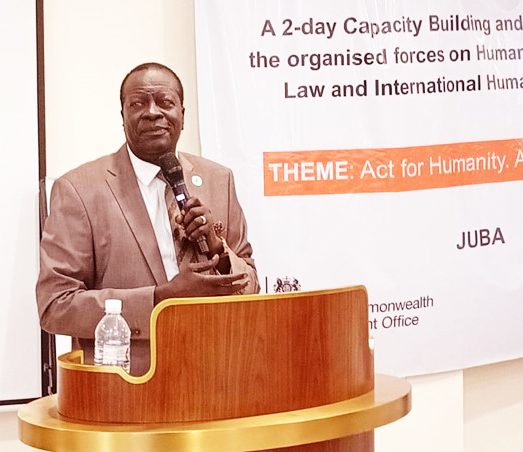By Alan Clement
The Deputy Minister of Defence and Veterans Affairs, James Koang Chuol, has urged South Sudan’s organized forces to become ambassadors of peace and human rights.
Speaking at the close of a two-day workshop on Human Rights and International Humanitarian Law, Koang said the transformation from instruments of war to agents of peace is vital to advancing the country’s nation-building and post-conflict recovery efforts.
“We must show the nation that we are a force for peace that protect, not harm; that serve, not intimidate,” the Deputy Minister stated, urging soldiers and civil servants to apply the principles learned during the training in their daily duties.
He said the country’s security institutions must now embody professionalism and accountability as South Sudan consolidates peace and stability.
Koang emphasized that the transformation of the defence and security sector was not merely theoretical but a national obligation central to restoring public trust and building lasting peace.
“This transformation is not just policy talk; it’s our duty to rebuild trust and secure lasting peace,” he said.
He said the Ministry of Defence is committed to fostering a culture of respect for human rights, justice, and the rule of law across all ranks.
“Our forces must reflect the values of justice, respect for human rights, and adherence to the rule of law,” Koang added.
Echoing the Deputy Minister’s sentiments, Dr. William Otwonh, a Member of Parliament at the TNLA, underscored the importance of understanding and applying international humanitarian law as part of this transformation.
He reminded participants that respect for human rights and the laws of war must become a guiding principle for both leaders and soldiers.
“We have learned how to respect human rights and take care of ourselves as human beings,” Dr. Otwonh said, highlighting the relevance of the Geneva Conventions and international customs that govern armed conflict.
“Some can keep the norms of the law and some they don’t but we must be the ones who do,” he added.
The workshop organized by Hold the Child with funds from the British Embassy also covered the Universal Periodic Review (UPR) process, which Dr. Otwonh described as a dialogue between South Sudan and the international community aimed at strengthening the country’s human rights commitments.
The Deputy Minister’s remarks come at a time when South Sudan is working to professionalize its armed forces under the Revitalized Agreement on the Resolution of the Conflict (R-ARCSS), which calls for unified command structures, justice reforms, and accountability mechanisms within the security sector.
Deputy Minister Koang concluded by reaffirming the ministry’s commitment to building a disciplined, people-centered army, saying the future of South Sudan depends on institutions rooted in peace, unity, and the protection of human life.
“Let us continue to work together to build peace, justice, respect for human rights, and the foundation of our national unity,” he concluded.




